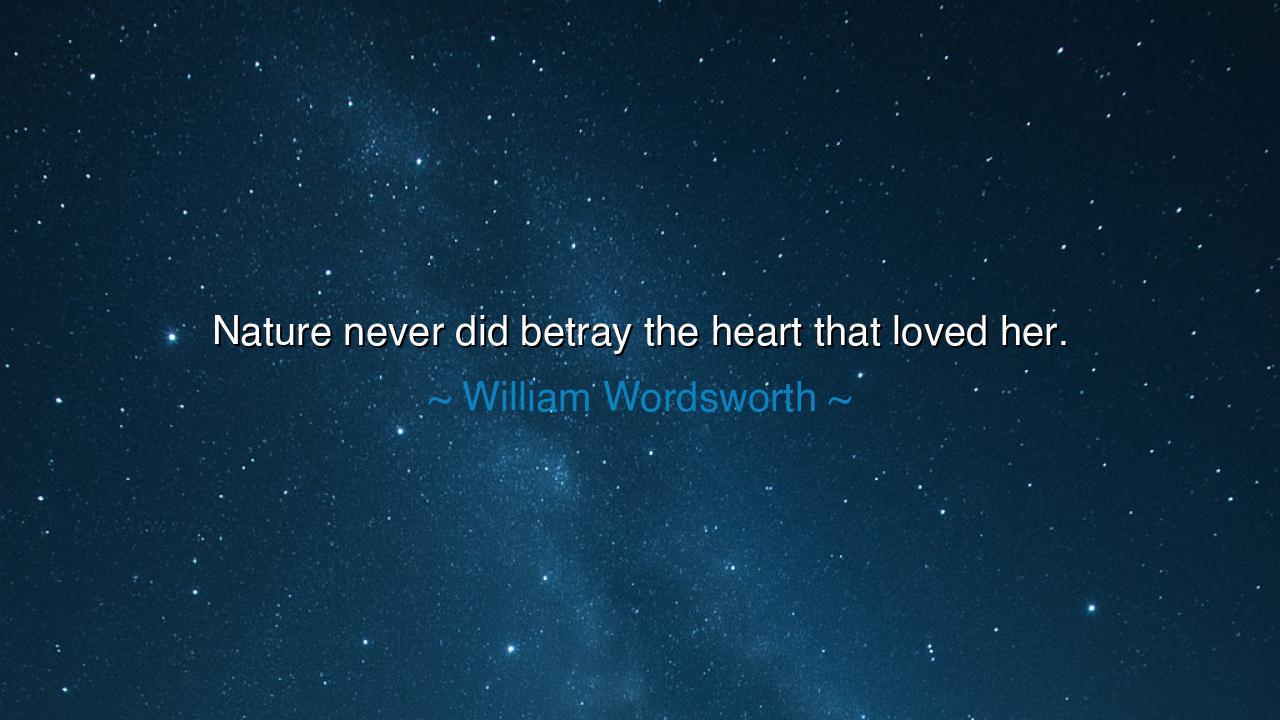
Nature never did betray the heart that loved her.






The words of William Wordsworth—“Nature never did betray the heart that loved her”—resound like a hymn sung by the earth itself. They remind us that to open one’s soul to Nature is to enter into a covenant that cannot be broken. While human beings may falter, deceive, or turn against one another, the mountains, the rivers, the forests, and the skies remain true to those who cherish them. They do not offer riches of gold or power, but gifts far greater: peace for the troubled mind, clarity for the weary heart, and inspiration for the soul that seeks meaning beyond itself.
The origin of this truth lies in Wordsworth’s own life as a poet of the Romantic age. Amid the turbulence of industrial change and social upheaval, he turned his gaze toward the eternal presence of Nature, finding in her constancy a source of comfort and wisdom. He believed that the natural world was not merely scenery for the eyes but a living spirit, a teacher and companion that whispers truths into the human heart. To Wordsworth, a heart that truly loved Nature would never be abandoned, for the earth gives herself in beauty and strength to those who honor her.
History itself provides us with luminous examples of this bond. Consider John Muir, the great naturalist who wandered the mountains and forests of America. In times of loneliness and hardship, he turned to Nature not as a stranger, but as a beloved friend. The wind in the pines, the rush of waterfalls, the silent majesty of glaciers—all became his companions. He testified, as Wordsworth did, that Nature offers healing and renewal to those who revere her. Muir’s life, much like Wordsworth’s verse, proved that the one who loves Nature is never truly alone, for she answers back with strength and solace.
The emotional power of Wordsworth’s words lies in their contrast with human frailty. We know too well that human promises are often broken, that loves may wither, and friendships may betray. But in the embrace of Nature, such fears dissolve. The sun will rise after the longest night. The spring will come after the cruelest winter. The bird will sing, the flower will bloom, the river will flow—indifferent to human error, yet faithful to the heart that delights in them. Thus, in the constancy of the natural world, we find assurance that outlasts the uncertainty of human bonds.
There is something deeply heroic in this vision. To love Nature is not only to enjoy her beauty, but to live in harmony with her rhythms. The one who loves the earth learns humility, patience, and reverence. He learns that greatness is not in conquest but in communion, not in domination but in harmony. For Nature is vast, untamable, and eternal, yet she welcomes those who approach her with awe and gratitude. To love her is to partake of her strength, to walk with a spirit that cannot be broken.
The lesson for us is clear: if we would live wisely and fully, we must love Nature not as a commodity, but as a companion. To walk among trees, to sit beside rivers, to gaze upon mountains is not idleness but restoration. In those moments, we receive gifts no wealth can purchase: calm, perspective, resilience, and joy. And just as Wordsworth proclaimed, we may trust that Nature will never betray such love. She may test us with storms, but even in the storm, she gives lessons of endurance. She may humble us with her vastness, but in that humility, we find truth.
What, then, shall we do? Let us return to Nature with open hearts. Let us walk in her fields, listen to her winds, and look upon her stars with reverence. Let us protect her from harm, so that future generations may know the same unbroken covenant. And let us remember that when human life grows heavy with burden, Nature still waits, steadfast and faithful, ready to offer her solace to any heart that loves her.
Thus, Wordsworth’s words endure as both promise and command: Nature never did betray the heart that loved her. To love her is to walk with constancy in a world of change, to find friendship where none deceives, and to carry within oneself the eternal peace of the earth.






AAdministratorAdministrator
Welcome, honored guests. Please leave a comment, we will respond soon